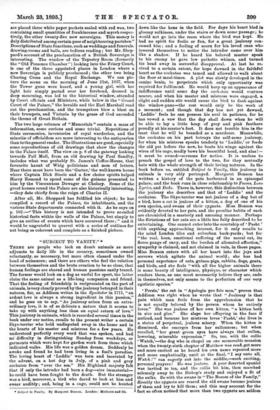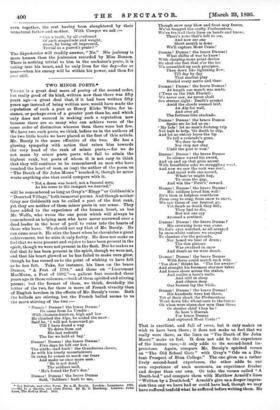"SUBJECT TO VANITY." *
THERE are people who look on dumb animals as mere adjuncts to daily life in the country, sometimes owned reluctantly, as necessary, but more often classed under the head of nuisances; and there are others who feel the relation between themselves and the brute creation to be so close, that human feelings are shared and human passions easily traced. The former would look on a dog as useful for sport, the latter claim the same animal as a life-long companion and friend. That the feeling of friendship is reciprocated on the part of animals, is very clearly proved by the jealousy betrayed in their natures, for, as Addison writes in the Spectator in 1711, "an ardent love is always a strong ingredient in this passion," and he goes on to say, "As jealousy arises from an extra- ordinary love, it is of so delicate a nature that it scorns to take up with anything less than an equal return of love." This jealousy in animals, which is recorded several times in the book under our notice, recalls to the present writer a certain Skye-terrier who held undisputed sway in the home and in the hearts of his master and mistress for a few years. He understood perfectly every word that was spoken, and had no difficulty in distinguishing Sunday from weekdays, or garments which were kept for garden work from those which indicated walks. His life was a golden dream. Suddenly he awoke and found he had been living in a fool's paradise. The loving heart of Laddie ' was torn and lacerated by the advent, on a hot day in July, of a pink and grey cockatoo from "over the sea." His Highland majesty felt that if only the intruder had been a dog—size immaterial— he could have been fought to the death. But the stranger was a bird, moreover, a bird who dared to look at him and swear audibly ; and, being in a cage, could not be hunted • Subject to Vanity. By Margaret Benson. London : Methuen and Co. down like the hens in the field. For days his heart bled in gloomy sulkiness, under the stairs or down some passage ; he would not go into the room where the bird was kept. He had no spirit for frolic or fun, for a great jealousy con- sumed him ; and a feeling of scorn for his loved ones who lowered themselves to notice the intruder came over him like a shadow. If he heard his beloved master speak to his enemy he gave low pathetic whines, and turned his head away in sorrowful disapproval. At last he re- vived to a certain extent, for hope dawned in the faithful heart as the cockatoo was tamed and allowed to walk about the floor at meal-times. A plot was slowly developed in the canine brain, to perpetrate which only opportunity was required for fulfilment. He would keep up an appearance of indifference until some day the cock atoo would venture nearer, and when his master and mistress were engaged, a slight and sudden stir would cause the bird to dash against the window-pane—the rest would only be the work of a moment ; and though that day has not yet dawned, Laddie ' feels he can possess his soul in patience, for he has vowed a vow that the day shall dawn when he will be able to lay a little heap of grey and pink feathers proudly at his master's feet. It does not trouble him in the least that he will be branded as a murderer. Meanwhile, the cockatoo on his part betrays the self-same jealousy, for when his mistress speaks tenderly to ' Laddie,' or feeds the old pet before the new, be beats his wings against the wires of his cage, madly bows his beautiful head, and alas !— it must be owned—screams for notice. It is useless to preach the gospel of love to the two, for they mutually hate with the whole strength of their loving natures. In the book before us, entitled Subject to Vanity, this jealousy in animals is very ably portrayed. Margaret Benson has written a history of the pets harboured in an episcopal palace; and the book rims in close relationship to Poems, Love- Lyrics, and Dodo. There is, however, this distinction between the jealousy she describes and that of ' Laddie ' and the cockatoo. The Skye-terrier was not jealous of a dog but of a bird, here a cat is jealous of a kitten, a dog of one of his own species, and swans of their cygnets. Miss Benson was evidently devoted to her pets, and the peculiar habits of each are chronicled in a masterly and amusing manner. Perhaps the flirtations of her cats are a little too fully described to be entertaining. One cannot enter into the courtship of Pasht ' with anything approaching interest, for it only recalls to the mind London tiles and suburban back-yards ; but for "the real, keen, emotional suffering of the moral cat, its fierce pangs of envy, and the burden of alienated affection,"
sympathy is claimed, and not claimed in vain, in these pages. Miss Benson enters with all her heart into the joys and sorrows which agitate the animal world ; she has had personal experience of cats, guinea-pigs, rabbits, dogs, goats, and birds, and she feels "with all the higher animals there is some beauty of intelligence, physique, or character which renders them, as one must necessarily believe they are, ends in themselves, not only means to the perfection of our very egotistic species."
Persia,' the cat in "Apologia pro fele men," proves that. Addison was right when he wrote that "Jealousy is that pain which man feels from the apprehension that he is not equally beloved by the person whom he entirely loves." She was jealous of her own kitten, "a kitten both in size and glee." She slaps her offspring in the face if noticed, and because her mistress loves Pasht,' she lives in a states of perpetual, jealous misery. When the kitten is dismissed, she emerges from her sullenness ; but when recalled, "her great green eyes have always that sullen, lowering, miserable expression." So, too, with the collie Watch,'—the dog who in chapel on one memorable occasion when the twenty-sixth chapter of Matthew was read, got more and more excited as he heard his own name repeated more and more emphatically, until at the final, "I say unto all, Watch I " ran eagerly out into the middle,—such exciting, personal prayers ! He was jealous. A poor deserted spaniel was invited to tea, and the collie bit him, then marched solemnly away to the Bishop's study and enjoyed a fit of the sulks. So with the swans in "The Bosom of the Family," directly the cygnets are reared the old swans become jealous of them and try to kill them ; and this may account for the fact so often noticed that more than two cygnets are seldom seen together, the rest having been slaughtered by their unnatural father and mother. With Cowper we ask :—
.‘ Can a truth, by all confessed Of such magnitude and weight, Grow, by being oft impressed, Trivial as a parrot's prate ? "
The Skye-terrier will readily answer, "No." His jealousy is more human than the jealousies recorded by Miss Benson. There is nothing trivial to him in the cockatoo's prate, it is eating into his heart, and he only lives for the day—far or near—when his enemy will be within his power, and then for ever still.







































 Previous page
Previous page